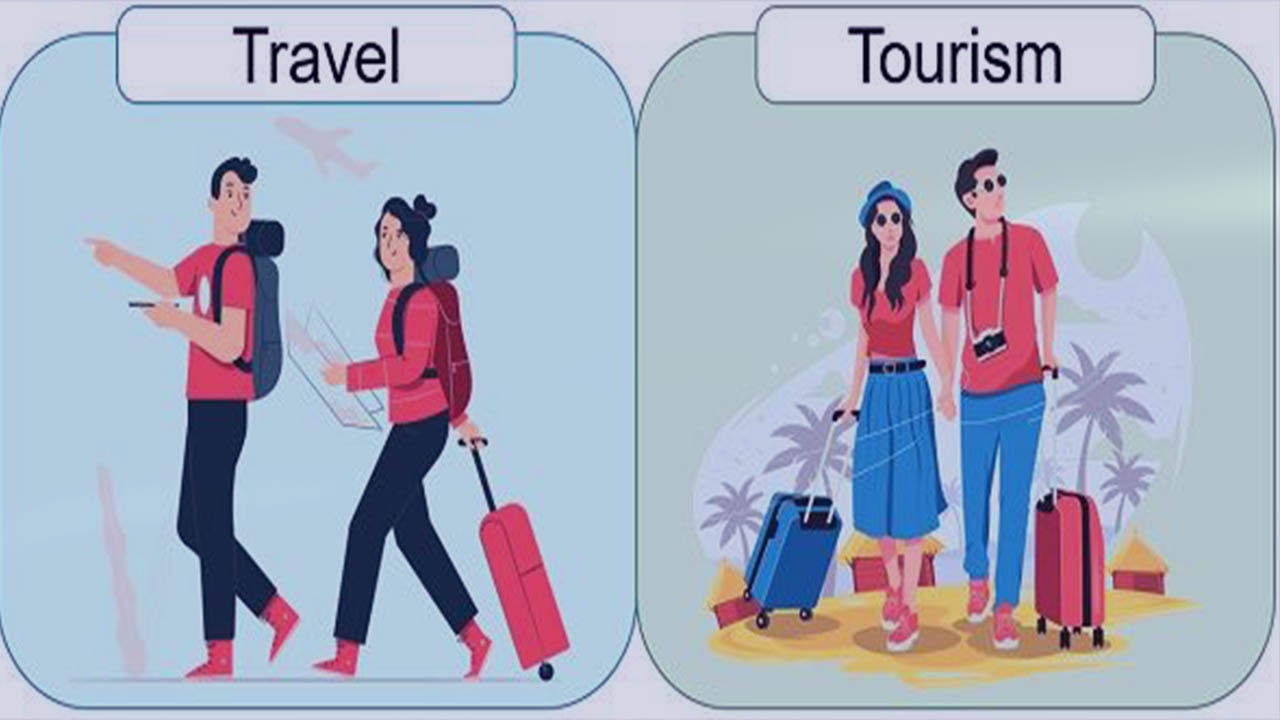Have you ever pondered over the nuances between traveling and going on a tour? While these terms are often used interchangeably, there exists a distinct disparity that sets them apart. Understanding the difference between tour and travel can significantly influence your vacation experiences and overall wanderlust pursuits. Traveling evokes images of freedom, exploration, and spontaneity, allowing individuals to immerse themselves in new cultures independently. On the contrary, a tour offers structured itineraries, guided experiences, and curated journeys that cater to specific interests or destinations. In this blog post, we delve deeper into decoding the distinction between tour and travel to help you navigate your next adventure seamlessly.

Defining Touring
When discussing Touring, refers to a structured or organized travel experience led by a tour guide or company. Touring involves predefined itineraries, group activities, and curated sightseeing opportunities.
Key Characteristics of Touring
- Guided Experiences: Tours are typically led by knowledgeable guides who provide insights and information about the destinations visited.
- Group Dynamics: Touring often involves traveling with a group of individuals, allowing for shared experiences and social interactions.
- Prearranged Itineraries: Tours have fixed schedules and planned activities, offering a structured journey from start to finish.
Advantages of Touring
- Convenience: Tour packages often include accommodations, meals, and transportation, eliminating the need for individual bookings.
- Local Expertise: Tour guides provide in-depth knowledge about the destinations, enhancing the travel experience.

Exploring the Concept of Traveling
Traveling is more than just visiting a destination; it’s about embracing new cultures, exploring different landscapes, and creating lasting memories. Whether you embark on a solo adventure or join a group tour, the essence of travel lies in experiencing the unknown.
The Essence of Travel
Travel allows individuals to step out of their comfort zones and immerse themselves in diverse environments.
It offers a chance to broaden one’s horizons and gain a deeper understanding of the world we live in.
Personal Growth and Discovery
When we travel, we not only discover new places but also learn more about ourselves.
Stepping out of familiar surroundings can lead to personal growth and self-discovery.

Comparing Tour and Travel Experiences
When considering what is the difference between tour and travel, it’s crucial to understand the distinctions in the experiences they offer.
Immersion in Local Culture
Tours often provide a structured itinerary, guiding tourists through popular attractions. On the other hand, travel allows for more flexibility, enabling deep exploration of local customs and traditions.
Freedom vs. Convenience
Traveling gives individuals the freedom to create their own schedules and venture off the beaten path. Tours, however, offer the convenience of hassle-free planning and guided experiences.
Key Differences Between Tours and Travel
When understanding the distinction between tours and travel, it’s crucial to recognize the nuances that set them apart. Tours often involve pre-planned itineraries with scheduled activities and guided tours, providing a structured experience.
Individual Freedom
Travel offers more individual freedom and flexibility, allowing travelers to explore destinations at their own pace and delve into unique experiences based on personal preferences.
While tours provide convenience and curated experiences, travel enables spontaneity and autonomy in decision-making.
Cultural Immersion
Engaging with local cultures and communities is often more immersive during travel, as it allows for authentic interactions and a deeper understanding of traditions and lifestyles.
- Travelers can immerse themselves in local customs and traditions.
- Participating in the daily activities of a community fosters cultural exchange.
Factors to Consider when Choosing Between a Tour or Travel
When deciding between a tour and independent travel, there are key factors to consider to make the best choice for your trip:
Flexibility
With independent travel, you have the freedom to create your itinerary as you go, while tours offer a structured schedule.
Flexibility in travel allows for spontaneity and exploration.
Cost
Consider your budget and compare the costs of booking a tour package versus organizing your travel arrangements independently.
Opting for a budget-friendly option can help maximize your trip.
Local Experience
Independent travel brings you closer to local culture and lifestyle, while tours often provide curated insights through guided experiences.
Immersing yourself in local traditions can enhance your journey.
Benefits of Booking a Tour
Booking a tour offers numerous advantages, ensuring a stress-free and well-organized travel experience.
Expert Guidance
With tours, you benefit from expert guides who offer in-depth knowledge about the destination enhancing your experience.
Cultural Immersion
Through tours, you have the opportunity to immerse yourself in the local culture, traditions, and cuisine.
- Interact with locals
- Experience authentic activities
- Discover hidden gems
Advantages of Independent Travel
Independent travel offers a myriad of benefits that often make it a preferred choice over organized tours. Traveling independently allows for flexibility and the freedom to create a personalized itinerary based on individual interests and preferences.
Unique Experiences
Exploring a destination independently enables travelers to discover off-the-beaten-path locations that may not be included in traditional tour itineraries. This leads to authentic and memorable experiences.
Immersive Cultural Interactions
Engaging with locals and immersing oneself in the local culture is easier when traveling independently. It allows for deeper connections and a better understanding of the destination’s traditions and way of life.
Popular Tourist Destinations for Tours
When it comes to planning tours, certain destinations stand out as must-visits for travelers seeking unique experiences. From ancient landmarks to natural wonders, these destinations offer a blend of history, culture, and adventure.
1. European Adventure
Explore the charm of Europe with its iconic cities like Paris, Rome, and Barcelona. Experience the rich history, art, and cuisine that make Europe a perennial favorite among tourists.
Get lost in the romantic streets of Paris and witness the breathtaking architecture of Rome’s Colosseum.
2. Tropical Escapes
For those craving sun-soaked beaches and crystal-clear waters, tropical destinations such as Bali, the Maldives, and Hawaii offer an idyllic retreat.
- Snorkel in the vibrant reefs of Bali‘s Nusa Penida
- Relax in the luxurious overwater bungalows of the Maldives
Must-Visit Places for Travel Enthusiasts
For travel enthusiasts seeking unique experiences, these destinations are a must-visit:
The Serene Mountains of Switzerland
Explore the picturesque landscapes and charming villages of Switzerland. Take a cable car ride to enjoy breathtaking views.
The Historic Streets of Rome, Italy
Wander through the ancient ruins and marvel at the architectural wonders in Rome. Visit the Colosseum for a glimpse of ancient history.
Don’t forget to taste authentic Italian gelato flavors while strolling through the cobblestone streets.
The Exotic Beaches of Bali, Indonesia
Experience the tranquility of Bali’s beaches and immerse yourself in the vibrant culture.
- Relax on the sandy shores of Kuta Beach.
- Explore the lush green rice terraces in Ubud.
- Discover underwater wonders while snorkeling in Amed.
Understanding Cultural Immersion in Tours and Travel
When it comes to experiencing the essence of a destination, cultural immersion plays a vital role. Unlike typical guided tours that skim the surface, cultural immersion involves deeply engaging with the customs, traditions, and local way of life.
The Importance of Cultural Immersion
Immersing yourself in a new culture fosters a deeper understanding and appreciation for the destination. It allows travelers to break barriers, challenge stereotypes, and develop a sense of empathy and respect towards diverse communities.
Experiencing local rituals, cuisine, language, and traditions firsthand can be transformative, offering a unique perspective that goes beyond mere sightseeing.
Tips for Cultural Immersion
- Interact with Locals: Engage in conversations with residents to learn about their daily lives and perspectives.
- Participate in Workshops: Join workshops or classes to explore traditional crafts, arts, or practices.
- Attend Festivals: Witnessing local festivals can provide insights into the cultural heritage and values of a community.
- Stay with a Local Host: Opt for homestays or community-based accommodations to gain an authentic insight into local lifestyles.
Personal Experiences: Tour vs. Travel
When considering the difference between a tour and independent travel, personal experiences play a vital role in shaping perceptions. Opting for a planned tour often offers structured itineraries and group activities, ensuring convenience and ease of exploration.
Guided Tours
Embarking on a guided tour provides travelers with professional insights and historical context, enhancing the overall journey experience. The organized approach allows for a deeper understanding of destinations.
Independent Travel
Conversely, independent travel empowers individuals to customize their itineraries and explore at their own pace, fostering a sense of freedom and spontaneity. It provides opportunities for authentic cultural experiences.
Frequently Asked Questions
What is the difference between a tour and travel?
- A tour typically refers to a planned trip with a specific itinerary and activities organized by a travel company or guide. On the other hand, travel is a broader term that encompasses the act of moving from one place to another, possibly for leisure, work, or other reasons.
Do tours and travel mean the same thing?
- No, tours and travel are related but have distinct meanings. While travel refers to the overall act of journeying from one place to another, a tour specifically implies a pre-planned, structured experience that may include guided activities, accommodation, and transportation.
How are tours different from independent travel?
- Tours are typically organized group experiences led by a guide or travel company, with fixed itineraries and activities. Independent travel, on the other hand, involves individuals or small groups planning and navigating their trips without a set schedule or guide.
What are some advantages of taking a tour over independent travel?
- Taking a tour can offer the benefits of convenience, organized schedules, local insight from guides, and the opportunity to meet and travel with others. Additionally, tours often include accommodations and transportation arrangements, reducing the need for individual planning.
Can I customize a tour to fit my preferences?
- Many travel companies offer customizable tour options where you can tailor aspects of the trip such as activities, accommodations, and destinations to better suit your preferences. This allows for a blend of structured touring with personalized experiences.
Final Words
In conclusion, the distinction between tour and travel lies in the structure and experience they offer. While travel encompasses independent exploration and freedom to customize your journey, tours provide pre-arranged itineraries and guided experiences. Understanding this difference can help you choose the best option based on your preferences and travel goals.
Whether you prefer the convenience and insights of a guided tour or the spontaneity and flexibility of solo travel, both options have their unique advantages. Ultimately, the choice between a tour and travel comes down to your personal preferences, budget, and the type of experience you seek.
So, the next time you plan a trip, consider what type of adventure suits you best and embark on a memorable journey that aligns with your travel style.

